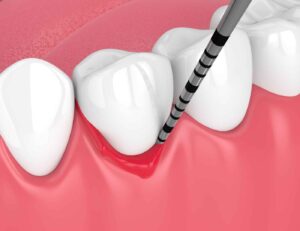Unlocking the Secrets of Peri-Implantitis: Safeguarding Your Smile
Your smile is not just an expression; it’s a reflection of confidence and happiness. Dental implants, a marvel of modern dentistry, have the power to revive that confidence by seamlessly replacing missing teeth. However, despite their general success and longevity, a condition known as peri-implantitis can pose a threat to the valuable work of dental implants.

In this comprehensive guide, Armadale team delve deep into the world of peri-implantitis, providing answers to your most pressing questions.
Understanding Peri-Implantitis: A Brief Overview
Peri-implantitis is a condition affecting the area around dental implants, akin to gum disease. It’s a stern reminder that, while dental implants are celebrated for their reliability, maintaining oral health remains vital.
The Genesis of Peri-Implantitis: Unraveling the Causes
To comprehend peri-implantitis, one must first grasp the concept of periodontitis, a chronic inflammatory condition affecting tissues around natural teeth. Peri-implantitis is essentially a variant specific to dental implant sites, sharing similarities in progression and causes with periodontitis.
Peri-implantitis commences when harmful bacteria form a biofilm around the implant, triggering an inflammatory response in the surrounding gum tissues. If left unaddressed, it can progress, causing bone loss and potential implant failure.
The Significance of Jaw Bone Loss
The jaw bone serves as the foundation anchoring the implant securely in place. When peri-implantitis leads to bone loss, several adverse effects may follow:
Implant Instability: Weakened bone foundation may lead to implant mobility, causing discomfort, affecting chewing, and potentially resulting in implant failure.
Aesthetic Consequences: Bone loss can create an unsightly gap between the implant crown and the gumline, compromising the aesthetics of your smile.
Compromised Chewing Ability: Gradual bone loss can impact your ability to bite and chew effectively, potentially leading to dietary restrictions and decreased nutritional intake.
Speech Difficulties: Changes in implant position due to bone loss can affect speech, causing difficulties or alterations.
Increased Risk of Further Bone Loss: Peri-implantitis-induced bone loss may lead to increased pressure on the remaining bone, potentially causing additional loss.
Risk Factors: Who Is Vulnerable to Oral Health Problems?
Understanding the risk factors associated with peri-implantitis is crucial for prevention. While anyone with dental implants can be susceptible, some factors can increase the risk:
Poor Oral Hygiene Practices: Neglecting regular oral care can create an environment conducive to peri-implantitis. Proper hygiene is your first line of defense.
Smoking: Tobacco, particularly in smoking, is a known risk factor, impeding healing and contributing to inflammation.
History of Periodontitis: Past periodontal disease increases susceptibility to peri-implantitis.
Systemic Diseases: Conditions like diabetes compromise the body’s ability to fight infections, increasing vulnerability.
Dental Factors: Implant design, quality, and the surgeon’s expertise influence the risk.
Treatment Options for Peri-Implantitis: Managing the Condition
The good news is that peri-implantitis can often be managed, especially when detected early. Treatment options may include:
Non-Surgical Approaches: Scaling and root planing, along with local or systemic antibiotics, can combat infection.
Laser Technology: Advanced technology like lasers can target bacteria and promote tissue regeneration.
Surgical Approaches: In advanced cases, flap surgery may be needed to access and clean the infected area. Bone restoration procedures might also be suggested.
Consistent follow-up and maintenance appointments with your dentist are crucial post-treatment to monitor healing and prevent recurrence.
Preventing Peri-Implantitis: Proactive Steps for Safeguarding Your Smile
Preventing peri-implantitis is preferable to treating it. Proactive steps include:
Maintain Impeccable Oral Hygiene: Regular brushing, flossing, and antimicrobial mouthwash use reduce bacterial load.
Regular Dental Check-ups: Schedule regular check-ups to monitor implant health and catch issues early.
Manage Systemic Conditions: Effectively manage conditions like diabetes through collaboration with healthcare providers.
Choose an Experienced Implant Surgeon: Opt for reputable and experienced implant surgeons who use high-quality materials for lasting benefits.
By understanding the causes, risks, and prevention strategies related to peri-implantitis, you can take proactive steps to ensure the longevity of your dental implants and enjoy your confident smile for years to come.
Remember, prevention is the key, but if you suspect any issues, consult Armadale or another professional promptly. We can be reached at tel:+19054725858.
